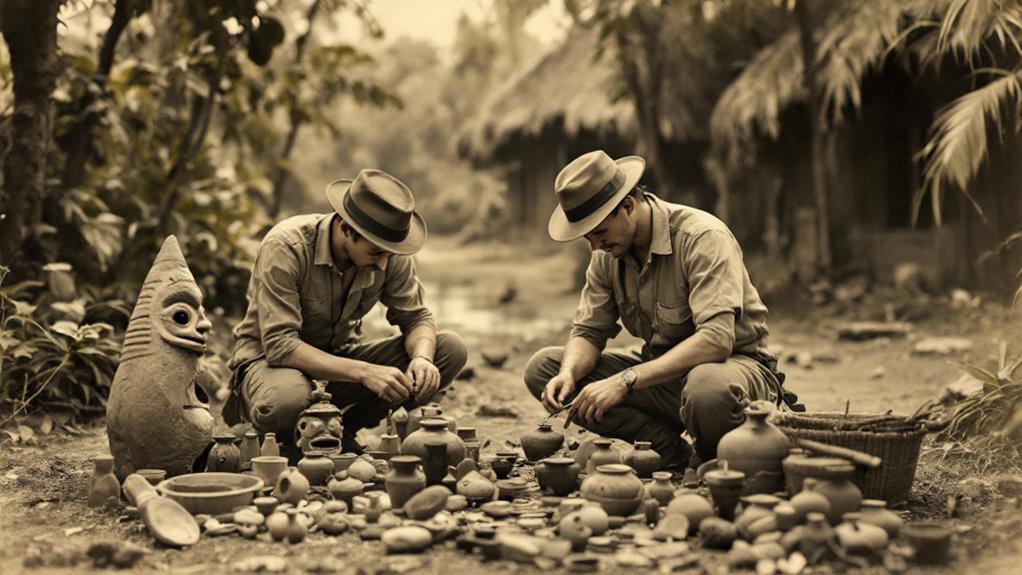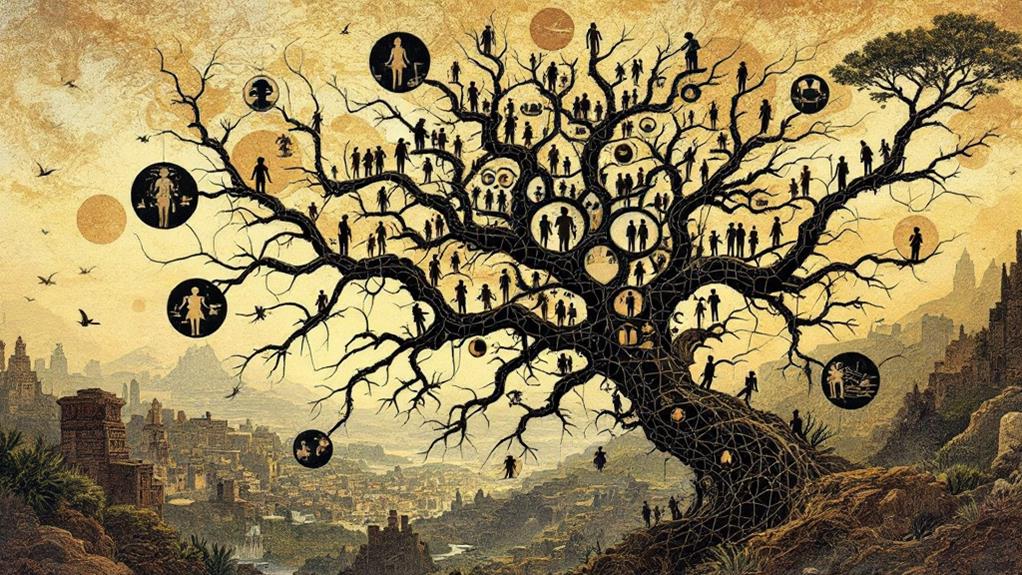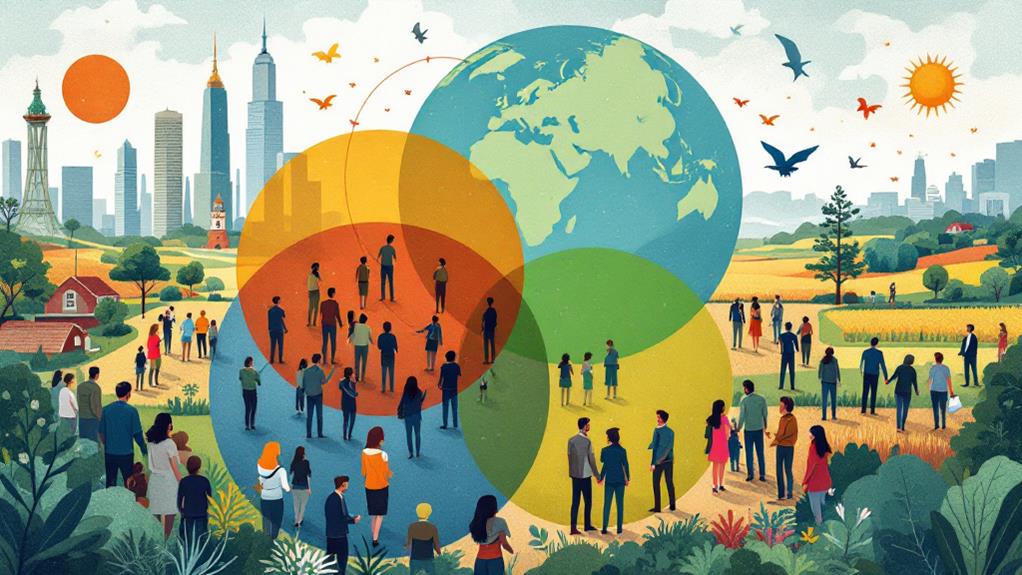The History of Anthropology: Understanding Human Cultures and Societies

Anthropology's roots stretch back to ancient civilizations' curiosity about human diversity. It emerged as an academic discipline in the 19th century, driven by European exploration and Enlightenment thinking. Early theories like social evolution and diffusionism laid the groundwork for modern anthropological approaches. The field revolutionized with the introduction of fieldwork and ethnography, allowing for deeper cultural immersion. Cultural relativism became a guiding principle, encouraging unbiased understanding of diverse societies. As anthropology evolved, it plunged into structural analysis, postmodern critiques, and new methodologies. The discipline continues to adapt, addressing contemporary issues and employing digital tools. There's much more to uncover about this fascinating field's expedition.
Origins of Anthropology
Curiosity about human diversity and culture has existed for millennia, but anthropology as a formal academic discipline didn't emerge until the 19th century. You'll find that early observations of human differences can be traced back to ancient civilizations, where travelers and scholars documented the customs and practices of foreign societies.
As European exploration expanded in the 15th and 16th centuries, you'll see a growing interest in understanding the diverse cultures encountered around the world. This period marked the beginning of systematic attempts to study and categorize human societies.
The Enlightenment era of the 18th century brought about a shift in thinking, emphasizing reason and scientific inquiry. You'll notice that this intellectual climate laid the groundwork for the development of anthropology as a distinct field of study.
In the 19th century, technological advancements in transportation and communication facilitated more extensive cross-cultural encounters. You'll find that this increased exposure to diverse societies, coupled with the rise of evolutionary theory, sparked a more formalized approach to studying human cultures. It's during this time that anthropology began to take shape as the academic discipline you recognize today.
Early Anthropological Theories
As anthropology emerged as a distinct academic discipline in the 19th century, several influential theories shaped its early development. You'll find that these early theories laid the groundwork for modern anthropological thinking, even though many have since been criticized or revised.
One of the most prominent early theories was social evolution, which proposed that human societies progressed through distinct stages of development. This idea, championed by scholars like Lewis Henry Morgan and Edward Tylor, suggested that cultures evolved from "primitive" to "civilized" states. While this theory's ethnocentric assumptions have been extensively discredited, it sparked important debates about cultural change and progress.
Another key approach in early anthropology was comparative studies. This method involved examining similarities and differences between cultures to identify universal patterns of human behavior. Franz Boas, often called the father of American anthropology, used comparative studies to challenge social evolutionary ideas and promote cultural relativism.
You'll also encounter other early theories, such as diffusionism and functionalism, which sought to explain cultural similarities and the purpose of social institutions, respectively. These theories, though flawed, contributed considerably to anthropology's development as a field of study.
Fieldwork and Ethnography

During the early 20th century, anthropology underwent a significant shift with the rise of fieldwork and ethnography as central methodologies. You'll find that this approach revolutionized the way anthropologists studied cultures, moving away from armchair theorizing to firsthand experience.
Fieldwork involves immersing yourself in a culture for an extended period, often living among the people you're studying. You'll engage in participant observation, where you'll not only observe but also take part in daily activities and rituals. This method allows you to gain an insider's perspective, understanding the culture from the insider's point of view.
Ethnography, the written account of your fieldwork, provides a detailed description of the culture you've studied. You'll document everything from social structures to belief systems, using your observations and interactions to paint a comprehensive depiction of the community.
This shift towards fieldwork and ethnography has greatly impacted anthropology. It's enabled you to gather more accurate and layered data, challenging previous assumptions and theories. By living among the people you study, you'll develop a deeper understanding of their worldview and experiences.
Cultural Relativism
Cultural relativism emerged as a key concept in anthropology alongside the rise of fieldwork and ethnography. As anthropologists immersed themselves in diverse cultures, they realized the importance of context in understanding human behavior and beliefs. This approach challenges you to suspend judgment and view cultural practices through the lens of the society in which they occur.
You'll find that cultural relativism encourages a more nuanced understanding of human societies. It asks you to ponder how historical, environmental, and social factors shape cultural norms. By doing so, you're better equipped to avoid ethnocentric biases and appreciate the complexity of human diversity.
However, cultural relativism isn't without its challenges. You'll encounter difficulties in maintaining objectivity, especially when faced with practices that conflict with your own moral standards. It's crucial to strike a balance between respecting cultural differences and addressing universal human rights concerns.
As you investigate anthropology's history, you'll see how cultural relativism has shaped the field's methodology and ethics. It remains a fundamental principle, guiding anthropologists in their quest to understand and represent human cultures accurately and respectfully.
Structural Anthropology

Structural anthropology frequently emerges as a critical movement in the field's history. You'll find that Claude Lévi-Strauss, a French anthropologist, pioneered this approach in the mid-20th century. He believed that cultural phenomena could be understood through underlying structures, much like language.
In structural anthropology, you're encouraged to look beyond surface-level observations to uncover deeper patterns. This approach focuses on:
- Kinship structures
- Myths and narratives
- Social organizations
You'll explore that structural anthropologists analyze these elements to reveal the universal principles governing human societies. They argue that cultures, despite their apparent differences, share fundamental similarities in their organization.
When exploring structural anthropology, you'll encounter the concept of symbolic meaning. This idea suggests that cultural elements, like rituals or customs, carry significance beyond their immediate function. You're challenged to interpret these symbols as part of a larger system of meaning within a society.
Postmodern Turn
Anthropology experienced a seismic shift in the late 20th century with the advent of postmodernism. This intellectual movement challenged the field's traditional methods and assumptions, forcing anthropologists to reconsider their roles as observers and interpreters of culture.
The postmodern turn brought epistemological challenges to the forefront, questioning the very nature of knowledge and truth. You'll find that anthropologists began to interrogate their own biases and the power dynamics inherent in their research. They recognized that their presence and interpretations could influence the cultures they studied, leading to a more contemplative approach.
This shift also highlighted the socio-political implications of anthropological work. You'll notice increased attention to issues of representation, voice, and authority in ethnographic writing. Anthropologists started experimenting with new forms of ethnography, incorporating multiple viewpoints and embracing subjectivity.
The postmodern turn wasn't without controversy. Critics argued it could lead to relativism and undermine the scientific basis of anthropology. However, it undeniably augmented the field by encouraging greater self-awareness and critical thinking about the complex relationship between researcher, subject, and the production of knowledge.
Applied Anthropology

As the field grappled with postmodern critiques, many anthropologists sought to demonstrate the practical value of their discipline. Applied anthropology emerged as a response, focusing on using anthropological knowledge to solve real-world problems. You'll find that this subfield bridges the gap between academic research and practical applications in various sectors.
Applied anthropologists work in diverse areas, including:
- Community development
- Policy implementation
- Corporate and organizational settings
You'll see their influence in designing culturally sensitive healthcare programs, advising governments on indigenous rights, and helping businesses understand cultural differences in global markets. They often collaborate with other professionals, such as urban planners, social workers, and public health officials.
In community development, applied anthropologists help ensure that projects are culturally appropriate and sustainable. They engage with local populations, gathering perspectives that inform policy implementation and program design. Their unique viewpoint allows them to identify potential cultural conflicts and propose solutions that respect local traditions while addressing contemporary challenges.
As you investigate applied anthropology, you'll uncover its growing importance in an increasingly interconnected world, where cultural understanding is essential for effective problem-solving and social progress.
Digital Age Anthropology
The rapid proliferation of digital technologies has ushered in a fresh chapter for anthropological research and practice. You'll find that anthropology in the digital era explores how humans interact with and within digital spaces, reshaping traditional fieldwork methods.
Virtual ethnography has become an indispensable tool, allowing you to observe and participate in online communities, social media platforms, and digital cultures. You can now study how people construct identities, form relationships, and navigate power structures in virtual environments.
Data mining techniques have revolutionized the way you analyze large-scale cultural patterns. You're able to process vast amounts of digital information, uncovering trends in human behavior that were previously difficult to detect.
Anthropology in the digital age also examines the impact of technology on society. You'll investigate how digital devices and platforms influence communication, work, education, and social norms across different cultures.
As an anthropologist in the digital era, you must adapt your research methods to keep pace with rapidly evolving technologies. You'll need to develop new ethical frameworks for studying online communities and protecting digital informants' privacy.
Future Directions

Looking ahead, three key areas are likely to shape the future of anthropology. As technological advancements continue to plunge human societies, you'll see anthropologists adapting their methods to study digital cultures and online communities. You'll also witness an increased focus on global issues like climate change, migration, and inequality, as these challenges reshape human experiences worldwide.
Interdisciplinary collaboration will play a pivotal role in anthropology's future. You can expect to see anthropologists working closely with:
- Data scientists to analyze large-scale cultural patterns
- Neuroscientists to probe the biological basis of human behavior
- Environmental scientists to study human-environment interactions
As you look to the future, you'll notice anthropology becoming more applied and engaged with contemporary issues. You'll see anthropologists contributing to policy debates, designing user-friendly technologies, and addressing social problems. The field will continue to evolve, embracing new tools and perspectives while maintaining its core commitment to understanding human diversity and complexity. You can anticipate exciting developments as anthropology adapts to a rapidly changing world, offering unique viewpoints into the human experience.



